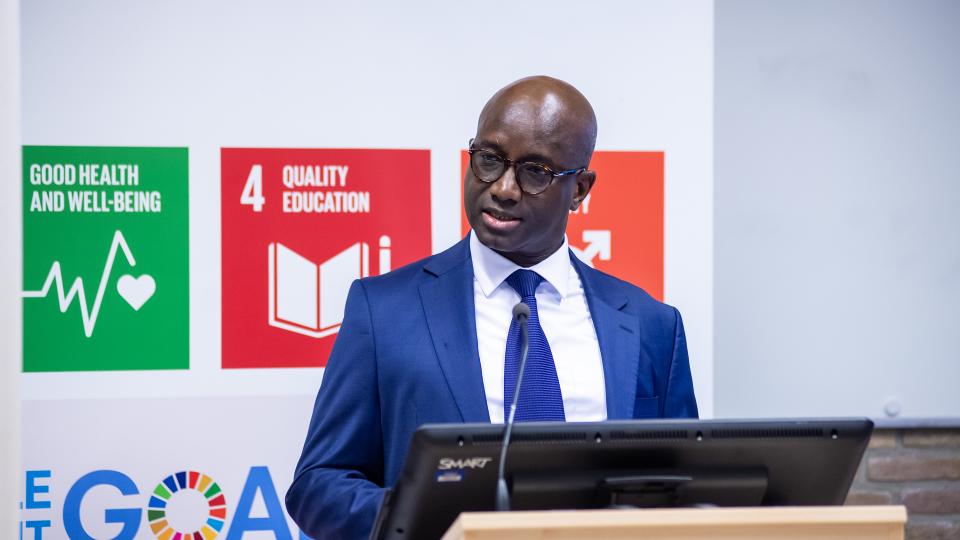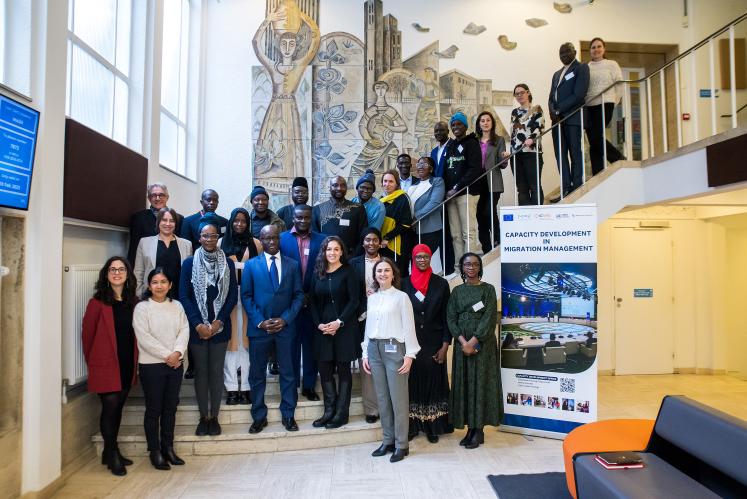Effective migration management relies on informed decision-making, strong institutions, and collaboration across sectors. Capacity development plays a crucial role in ensuring that policymakers and civil servants have the knowledge and tools to navigate complex migration challenges. At UNU-MERIT, we are committed to strengthening this expertise through targeted training programs that foster cooperation and long-term solutions.
On 10 February, we welcomed a delegation from The Gambia for the opening of our Migration Management Training program. Designed to strengthen governance and intergovernmental cooperation, the training provides a platform for knowledge exchange between policymakers, academics, and migration experts.
A Collaborative Approach to Migration Policy
The opening ceremony brought together key stakeholders from The Gambia and the European Union, reinforcing the shared commitment to strengthening migration governance.
Prof. Dr Clemens Kool, Director of UNU-MERIT, opened the event with a clear message: "Migration management is most effective when we learn from each other and collaborate—across sectors and across regions." H.E. Pa Musa Jobarteh, Ambassador of The Gambia to the EU, attended in person, emphasising the importance of international partnership in addressing migration challenges. Joining remotely, H.E. Carmen Hagenaars, Ambassador of the Netherlands to Senegal and The Gambia, echoed the need for balance: "Effective migration management requires a balanced approach—one that ensures security, protects human rights, and fosters social and economic development."
Graziella Rizza, Head of Sector at DG HOME, and Ms Jennifer Tangney, Senior Project Manager at ICMPD, also delivered opening remarks, highlighting the strategic and operational backing of EU institutions in shaping responsive and sustainable migration frameworks.
Together, these contributions set a collaborative tone for the day, marking the start of a meaningful exchange among participants and partners.
As part of the programme, participants travelled to Brussels from 19–20 February for in-depth sessions with institutions at the forefront of EU migration policy. They engaged with experts from ICMPD, DG HOME, DG INTPA, and the European External Action Service (EEAS), gaining a chance to dive into key areas such as returns, border management, and international cooperation.
Here’s a short video capturing the key takeaways from the trip—highlighting the importance of this training and its real-world relevance.
As the training concludes, participants return home equipped with fresh knowledge and stronger networks to drive change in The Gambia's migration governance landscape.
Dr. Mindel Van de Laar, Director of UNU-MERIT's Capacity Development Office, reflects:
“Migration is here to stay, and effective management depends on understanding both regional and global developments. Evidence-based policymaking is crucial—data allows us to separate fact from myth, ensuring informed decisions. While education alone cannot transform migration management overnight, it is the first step toward meaningful change. Beyond building expertise, joint training programmes like ours create valuable networks. In many countries, professionals across institutions do not naturally collaborate, but bringing them together fosters connections that enhance long-term cooperation and policy impact.”
Cristina Mancigotti, Capacity Development Coordinator at UNU-MERIT, adds:
"In our capacity development offerings focused on migration, we often engage a diverse group of professionals from various regions, backgrounds, and ministries. Programmes such as our Migration Management Diploma Programme (MMDP) attract truly global participants working on migration-related issues. While these global programs are valuable, focusing on a single country—such as through our Migration Management the Gambia Training (MMTG)—allows us to take a deeper dive into specific research topics and migration data relevant to the Gambian context. It also provides a unique opportunity to bring together representatives from different ministries, creating a space for them to explore their diverse perspectives and priorities regarding migration management.
These country-specific trainings also showcase the impact of the MMDP programme. In fact, the idea for this training originated as a spin-off from MMDP. We first discussed the possibility back in 2023 with Mr. Musa Camara – back then one of the MMDP participants – collaborating on relevant topics and curriculum design that would be beneficial for Gambian government representatives.


We are also looking forward to reconnecting with the training participants later this year through an online reunion. This follow-up session will be an opportunity to reflect on the key takeaways from the training a few months after its implementation. It will also serve as a platform for participants to share how they are applying—or planning to apply—the knowledge and insights gained during the training within their respective workplaces. This continued engagement not only reinforces learning but also helps us understand the effectiveness of our capacity development efforts."
This training goes beyond theory. It’s a hands-on experience where participants work closely with policymakers, academics, and experts to craft real-world solutions. By encouraging inter-ministerial collaboration and international exchange, the programme builds The Gambia’s capacity to manage migration more effectively ensuring that policies are not only informed, but adaptable and aligned with global standards.
We’re proud to support Gambia on this journey—and look forward to seeing how this shared learning shapes migration policy across the region in the years ahead.
This publication has been produced with the financial support of the European Union, contracted by ICMPD through the Migration Partnership Facility. Its contents are the sole responsibility of UNU-MERIT and can under no circumstances be regarded as reflecting the position of the European Union and the one of ICMPD.

Suggested citation: "Building Stronger Migration Management: UNU-MERIT Kicks Off Training for Gambian Civil Servants ," United Nations University, UNU-MERIT, 2025-04-16, https://unu.edu/merit/article/building-stronger-migration-management-unu-merit-kicks-training-gambian-civil.


